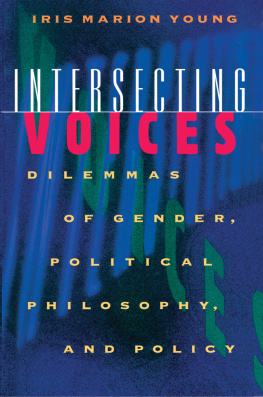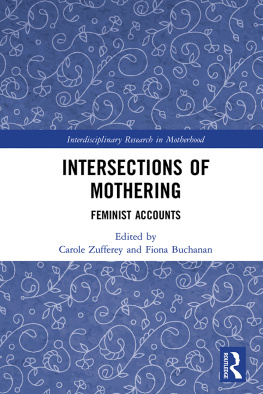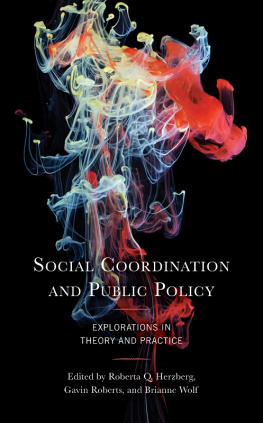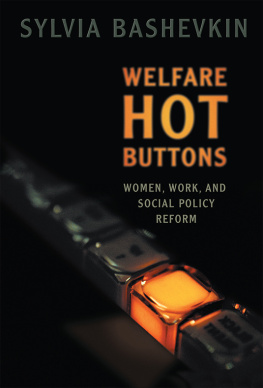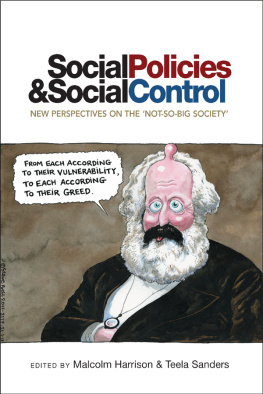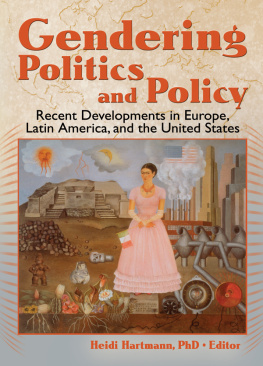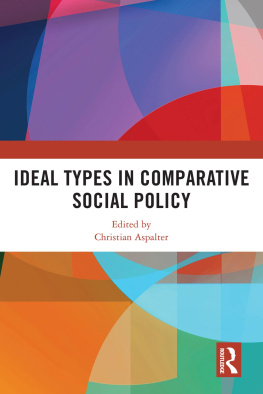Copyright 1997 by Princeton University Press
Published by Princeton University Press, 41 William Street,
Princeton, New Jersey 08540
In the United Kingdom: Princeton University Press, Chichester, West Sussex
Library of Congress Cataloging-in-Publication Data
All Rights Reserved
Young, Iris Marion, 1949
Intersecting voices : dilemmas of gender, political
philosophy, and policy /Iris M. Young.
p. cm.
Includes bibliographical references and index.
ISBN 0-691-01201-6 (cl: alk. paper).
ISBN 0-691-01200-8 (pb : alk. paper)
eISBN 978-0-691-21635-5
1. Feminist theory. 2. United StatesSocial policy1993- 3. Sex role. I. Title.
HQ1190.Y678 1997
305.4201dc21
97-2102
CIP
R0
ACKNOWLEDGMENTS
MOST OF THESE ESSAYS have been previously published. I am grateful to the following journals and publishers for permission to reprint them here: University of Chicago Press, for Gender as Seriality: Thinking about Women as a Social Collective, which originally appeared in Signs: A Journal of Women in Culture and Society, vol. 19, no. 3 (1994); and for Mothers, Citizenship and Independence: A Critique of Pure Family Values, which originally appeared in Ethics: A Journal of Political, Legal and Moral Philosophy, vol. 105, no. 3 (1995); Feminist Studies, vol. 20, no. 1 (Spring 1994), where first appeared Punishment, Treatment, Empowerment: Three Approaches to Policy for Pregnant Addicts; Constellations: An International Journal of Critical and Democratic Theory, for Asymmetrical Reciprocity: On Moral Respect, Wonder, and Enlarged Thought, first published in vol. 3 no. 3 (January 1997); Bridget Williams Publisher, for Communication and the Other: Beyond Deliberative Democracy, first published in Anna Yeatman and Margaret Wilson, Justice and Identity: Antipodean Practices (1995); and Westview Press, for Reflections on Families in the Age of Murphy Brown: On Justice, Gender and Sexuality, first published in Christine DiStefano and Nancy Hirschmann, Revisioning the Political (1996).
I am lucky to have a wide community of friends and colleagues with whom I have discussed the ideas in most of these essays at seminars and conferences. In each essay I acknowledge those people who helped me improve it through critical readings. Here I thank a few people for their ongoing intellectual support over the years those essays were written: Linda Alcoff, Robert Beauregard, Seyla Benhabib, Joe Carens, Frank Cunningham, David Ingram, Jenny Nedelsky, Molly Shanley, Bill Scheuermann, and Joan Tronto.
For a quarter century David Alexander has given unflinching criticism and unflagging support to my work, for which I remain ever grateful. Finally, I dedicate this book to Sandra Lee Bartky, the first philosopher who made me believe that I had something to say to the world.
Intersecting Voices
INTRODUCTION
THESE SEVEN ESSAYS share a project of feminist critical theory. With the term feminist I refer to no particular doctrine or concrete political program. Rather, the term refers to a mode of questioning, an orientation and set of commitments, with two aspects. First, feminism here means attention to the effects of institutions, policies, and ideas on womens well-being and opportunities, especially insofar as these wrongly constrain, harm, or disadvantage many if not all women. Entailed by such attention is a commitment to ameliorating such harms and disadvantages. Second, some of the work in these essays is feminist in the sense that it draws on womens experiences, or on social and philosophical reflection that takes itself to be from womens perspectives, as resources for developing social descriptions and normative arguments. Neither of these meanings of feminism entails a claim to common attributes, circumstances, or harms that all women share.
Some people think that questions and commitments like these are out of date. Unfortunately, fashion seems to guide contemporary intellectual and political life as much as it rules hairstyles or shoe heels. Too many people think that ideas should be rejected on the grounds that they were first espoused more than five years ago, rather than asking whether they have intellectual substance. Others think that political claims to justice should be rejected because people are tired of hearing about the same old grievances, rather than asking whether the social conditions that seemed to validate the grievances uttered twenty years ago have changed.
There is no doubt that feminist ideas and movements have brought about major changes in attitudes and institutions all over the world in the last thirty years. These changes have improved the lives of many women, and I would hazard to say many men as well. But the basic social conditions to which feminists called attention twenty years ago for the most part have not improved, and in some areas of the world they have deteriorated.
I will give just two examples. First, many countries today attempt to collect data on rates of rape and battery of women, and in many countries women appear to have become more willing to report their victimization. Both official data and victimization surveys show shockingly highand increasingrates of violence against women in many parts of the world.
Second, while the operations of global capitalism have significantly increased womens labor force participation rates compared with mens, there has been virtually no change in the burden of unpaid household work that the vast majority of women also carry, often without much help from or even the household presence of men. Indeed, it can be argued that in the last twenty years womens domestic work has increased in many places, at least partly because governments have reduced the social service provision that often eases these burdens.
Thus continues a need to pay specific attention to the situation of women, in particular their social, cultural, and economic circumstances, and to have normative criteria for evaluating whether society specially constrains or oppresses women. Womens movements in the Northern Hemisphere have been more quiescent in the past ten years than before, but feminist organizing persists in those societies. In the meantime, womens movements in many parts of the Southern Hemisphere have caught up with and perhaps even surpassed the strength and creativity of the Northern movements. Anyone who doubts the contemporary appeal and capacity for mobilization of issues of womens freedom and opportunity for the 1990s need only consider the amazing diversity of women and issues that converged on Beijing in conjunction with the fourth U.N. conference on women in September 1995. That gathering expressed no unity of women or feminism, but it did manifest a determination to keep womens specific well-being on the policy agenda of governments and international organizations.
These essays, all written since 1990, combine several projects under critical theory: developing concepts for describing social relations and processes; accounts of subjectivity and communicative interaction; and normative moral and political theory. Each of these kinds of theorizing aids the others. Moral and political theory assumes both accounts of agents and their interaction and descriptions of the social relations they constitute and which condition their actions. Such ontology and social theory, however, themselves presuppose normative commitmentsto freedom, equal moral worth, welfare, and human flourishing. Not only does critical theory take social and normative theory to be mutually conditioning in this way, it is also guided by practical commitment to emancipation in posing questions and evaluating answers. Consistency, coherence, empirical support, and like criteria remain standards of knowledge, but critical theory in addition specifically asks questions the answers to which, it argues, enable liberatory action and institutions. Some of the essays in this volume are more generally theoretical, while others reflect on the concrete context of lifeworld experience of moving through rooms or public debate about drug or welfare policy. I reject a distinction between pure and applied philosophy, however. The most policy-oriented essays in this volume claim to make original theoretical contributions, and the primary value of the more generally theoretical essays, I believe, is their illumination of action and policy.

